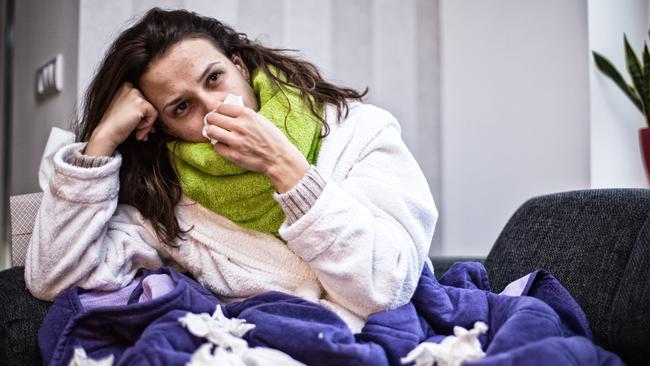Covid-19 has helped reduce cases of flu, whooping cough, hepatitis
Despite being stuck in lockdown and unable to travel overseas, Covid-19 has helped Australians beat other killer diseases.

Coronavirus
Don't miss out on the headlines from Coronavirus. Followed categories will be added to My News.
Covid-19 has delivered a surprise silver lining – the rates of other deadly diseases more than halved in the last year.
Influenza had the biggest drop, with the number of cases plunging by 93 per cent between 2019 and 2020.
There were also dramatic reductions in presentations for measles (down 91 per cent), dengue virus infection (down 85 per cent), rotavirus (down 73 per cent) and whooping cough (down 71 per cent), an analysis of official government data by comparison service Finder found.
“Social distancing, improved personal hygiene and a shift in attitude when it comes to turning up to work or school sick has led to a big reduction in the prevalence of diseases in Australia.” Taylor Blackburn, Finder spokesperson.

The gains are being maintained with only 294 confirmed cases of influenza in January to May this year, compared to over 20,452 cases at the same time last year (99 per cent drop).
Last year just 37 people died from the flu — a fraction of the more than 900 deaths in 2019 — and so far this year there has not been a single death recorded due to influenza.
However, infectious diseases experts are warning these gains are at risk now the national lockdown is over and social distancing restrictions have been relaxed in most states.
The biggest problem is that people are not getting the flu vaccination at anywhere near the same rate as last year, Immunisation Coalition spokesman Dr Rod Pearce said.
GP clinics were already seeing a big uptick in cases of the common cold and this was an indication that influenza could soon be spreading as winter arrived, he said.
“A third of Covid swabs are coming back as rhinovirus (one of the key viruses that causes the common cold),” he said.
“People are shedding and spreading germs, kids are getting infections, we’re getting into winter, so that’s a scenario for under vaccinated people who weren’t exposed to flu last year -that sets us up to get influenza.”

One of the downsides of last year’s minimal influenza infections was that more people were susceptible this year.
“There are some epidemiological studies suggest that one very quiet year is followed by a big year because of the lack of herd immunity and that means it’s even more important to maintain high vaccination rates,” Dr Pearce said.
University NSW infectious diseases expert Professor Mary-Louise McLaws said the record 14 million doses of flu vaccines delivered last year certainly reduced the level of influenza.
“Not having people come in directly off the plane and into the community also helped … but for measles and others, that childhood level of vaccination certainly made a difference,” she said.
Low rates of infectious diseases has not led to a fall in Australia’s overall death rate.
Deaths due to cancer were up 426 in January and deaths from dementia were up 18.8 per cent above the five year average.
The Australian Bureau of Statistics reports overall there were 831 more deaths (up 4 per cent) by April 2021 compared to the five year average between 2015 and 2019.
And Cancer experts are predicting the surge in cancer deaths will continue after a decline in screening in 2020 meant many cancers would be detected later when they were harder to treat.
More Coverage
Originally published as Covid-19 has helped reduce cases of flu, whooping cough, hepatitis





